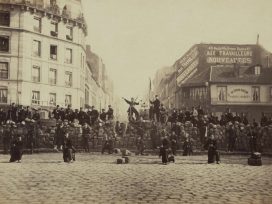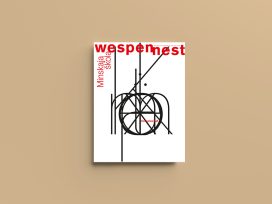Resting is a dark novel, one of the darkest to have emerged from contemporary Hungarian literature. And at the same time, as far as human psychology and political farce is concerned, it is one of the most illuminating. That’s right: the drama – one of well-nigh classical (or at least Dostoyevskian) proportions – has many dimensions. And the “rest” of the title remains an unattainable topos of longing.
At the centre of the novel, which revolves around fear, violence, and madness, is the first-person narrator: Andor Weér, thirty-six, writer, and son of the eccentric actress Rebeka Weér, who not only tyrannizes his life, but has also destroyed it. Andor’s meandering narrative tells of a hellish family drama that, because its devastating consequences cannot be eradicated, only apparently ends with the death of the mother. The text labours painfully back and forth in staggered flashbacks, until every detail, every emotion, is brought to light, until the rule of madness makes itself felt in every facet.
Rebeka Weér is a diva like Arcadina in Chekhov’s The Seagulls: ambitious, egotistic, concerned only about her own success. She is flattered from all sides, maintains lovers constantly, and treats her two children – the twins Andor and Judit – like burdensome appendages. The children rebel: Andor, when, at the age of ten, in order to extort his mother’s love, he pretends to have gone blind, and later seeks refuge in writing; Judit, in dedicating herself entirely to playing the violin. As an outstanding violinst, she one day takes the advantage of a guest performance in order to defect abroad. The mother must atone for the daughter’s political “treachery”: from now on the Communist cultural bureaucracy allocates her only minor roles. There follows a spectacular description of how she races through the streets of Budapest, a wailing fury who, on arriving home, seduces her consoling son.
From now on Rebeka swears revenge, above all on her daughter. Not only does she renounce her, she also seals the break with a staged-managed funeral. All Judit’s belongings and mementoes are brought in a wooden coffin to the grave. A regular gravestone in the Kerepesi cemetery feigns her death. The matter comes to light, and from now on Rebeka is assured the hate not only of her children, but also of her patrons. After receiving notice of her own death, Judit stops writing letters, only sending money anonymously. It is her brother who, to calm the mother, fakes letters from Judit, giving them to friends travelling abroad to post. Only much later does the reader find out that Judit took her own life at twenty-five in Nice, as a renowned violinst, who, tellingly, had taken the name Rebecca Werkhard.
The life of mother and son more and more resembles a nightmare. The former actress no longer leaves her flat. For a whole fifteen years she is supposed to have lived in voluntary incarceration, surrounded by nothing but theatre props, watching jealously over the life of her son, without contact to the outside world, behind locked doors, succumbing to the rapid advance of madness. Sartre’s dictum (in Huis Clos) that “Hell is the other” becomes reality. Relentless are the everyday rituals, cruel the verbal interrogations (introduced by “Where-were-you-son?”), the threats, curses, interdependencies. The mood sometimes reminds the reader of Elfriede Jelinek’s The Piano Teacher. Here there are also escape attempts. The sensitive writer-son not only becomes a regular customer of bars: one of his planned escapades ends in the dismal bed of a washed-up old prostitute, who later poisons pigeons and then herself; meanwhile, his mother’s tyranny and his own psychological impairment threaten to derail his love for Eszter Fehér.
Eszter is damaged like Andor: her parents were killed in Romania by the secret police, and she herself was abused by a carer. Sure enough, the unhappiness continues with Andor: abortion, mental hospital, suicide attempt; verbal and physical violence pollute the relationship, whose outcome remains open. Nevertheless, there is something fateful in it. Thanks to Eszter, Andor makes the acquaintance of the editor Eva Jordán, who not only publishes his book but also shamelessly seduces him, in doing so revealing herself as the former lover of his father, a spy who defected to America. Also thanks to Eszter, or her temporarily empty flat, Andor performs the monumental feat of not showing up at his mother’s for a fortnight. When he returns, she is dead. (A post-mortem is dispensed with in order to avoid suspicion).
Attila Bartis narrates with cold precision, in tense meanderings, without sentimentality, full of inner fury – and here and there with a dose of sarcastic humour. Bit by bit, the chronologically broken narrative coheres into a plot, into a portrait of a person who, torn between Oedipal complex and artistic sublimation, says of himself at the end: “Of course I’m afraid. But as long as the stove is warm, I still have human features. If I were sitting out in the open, let’s say in the yard of a house at the side of a lake, somewhere in some godforsaken region, in the Carpathian Mountains, I could also just write that there’s one thing that fills me with awe: the firmament above me. And that’s still very little.”
The little transcendence admitted by this dark, ironic novel shimmers through in sentences like this. Perhaps, in distant galaxies, a better, more beautiful world conceals itself (astronomy is often alluded to) – our world down below offers no cause for hope. Bartis shows this, not only with his grandiose “psychodrama” (without striving explicitly towards psychology), but also as observer of his times. Because Resting is not least also the portrait of an epoch: of the late Kádár era and the collapse of Communism in Hungary. Brilliant is the mockery Bartis directs – once from the child’s perspective, then as an adult – at the officially sanctioned stage appearances of Rebeka Weér, or the milieu of the bar, through which the voice of the people resounds: anti-Semitic outbursts or idiotic pleas for a “racially pure Hungary”. The reader wanders with Andor through the courtyards, cheap hotels, parks, and cemeteries of Budapest; accompanies him on reading tours through the Hungarian provinces, where he meets gypsies and village priests, station masters and the disabled, repelled by the banality of the general greed. Whereby his disillusion leaves nothing to be desired: freedom, according to Andor, is a condition not suited to humans. As regards his own writing – which is dark like Resting itself – he does not delude himself. However, this much he does know: “My stories were good for at least one thing: that every person, in this or that comma or full stop, could sound out his own silence.”
A poetic acknowledgement that could come from Bartis himself. In fact, despite everything, this highly dramatic novel gives space to silence. In the same way that it allows space to breathe. Unlike Bartis’s ambitious debut, The Stroll, with its many eclectic sideways glances at literary history, Resting follows a broad, vortex-like rhythm, and an utterly coherent inner dramaturgy. It is beyond doubt that we as readers arrive at ourselves. At our own obsessions, in our own silence.
Transcript of a speech held at the Alte Schmiede, Vienna, November 2005.
Read an excerpt from the novel Resting by Attila Bartis.






